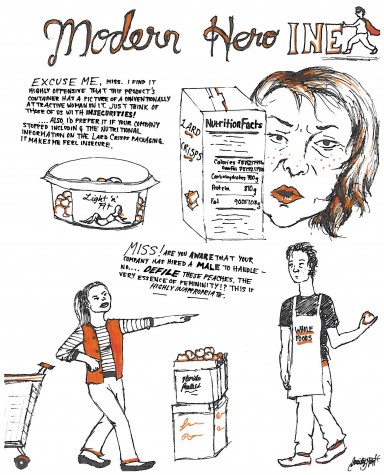When it’s the right choice, it works perfectly
Class of 2015 has major decision on on its hands: money or happiness
October 6, 2014
For those students in the Class of 2015, college begins in about 337 days.
For many of us, that day will mark the beginning of a new phase in life, a phase marked by a change in education style and philosophy. As we enter college, we go from learning that is forced upon us (mandatory classes, required exam scores, compulsory education) to optional learning (nobody is forcing you to attend college). For the first time in our lives, we will truly make our own educational decisions.
In many ways, what we do with this decision-making power will shape the rest of our lives. And although there will be many choices, each with its own set of consequences and outcomes, few will be more impactful, more important, than the answer to this question: What will you do for work?
The quest to answer to this question begins in the second half of high school, or college, or even graduate school. We will try to answer not only what we, as young adults, are interested in, but also, and perhaps more importantly, what we will study in college.
Each student goes about deciding what they will major in college differently, but I’ve found that a large amount of seniors are driven primarily by what fields allow college graduates to make the most money. To me, this makes sense. A career path that leads to wealth is inherently appealing, and rightly so. For the most part, money makes life better.
However, I argue that choosing a career field (and therefore a major) based on what you love to do, as well as on what makes a positive influence in the world, is infinitely more important than the amount of money one makes working in it.
Using general time estimates, the average adult with a full-time job spends about 32 percent of the waking hours at a job. Take away weekends and vacations, and that number jumps to 47 percent. Every Monday, Tuesday, Wednesday, Thursday, and Friday of your adult life, about half of your time will be taken up by your job.
First, don’t you want to love what you’re doing? And second, and possibly more importantly, don’t you want that time to have mattered? Don’t you want for those 68,680 hours to have amounted to something, something more than a nice house and a nice car?
In 2065, when each member of the Class of 2015 is nearing the age of 70, being able to say that you made an impact, that you positively influenced even one person through your work, is more valuable and more important than saying that you made a lot of money.
Along with making an impact, being happy should be considered significantly above how much money you will make when choosing a career. In the next 40 years, you will wake up approximately 14,600 times. You’ll be waking up for work about 70 percent of them. To wake up in a small house, with a small TV in it, and a small, old car parked in front of it, and then drive to a place in which you are truly happy, makes for a better life than waking up in a big house with a big TV in it, and a big, new car parked in front, only to drive to a place where you are truly sad.
I understand that sometimes you can have both things. Sometimes you can wake up in a big house and go to a place you love. But if there comes a time where you must choose between the money and the happiness, and for most people this time does come, remember the words of the Verve in “Bitter Sweet Symphony”: “You’re a slave to money then you die.”
Don’t be that slave. Do what you love to do, and accept that it’s better to be poor and happy than to be rich and sad.
–Oct. 5, 2014–




















